Archive for the Uncategorized Category
A website with all 250 of my #NerdCryptic clues so far!
The website itself is a retro exercise in anti-style. Written in plain HTML with no UI frameworks or loading screens in sight, all colour and font decisions have been left for your browser to make.
It’s been 11 years since I last updated my home entertainment system (2007 original) and a lot has changed in that time. Speakers got smart, game consoles got better, streaming audio and video is normal, and we’ve got the better internet to support it all. So here’s the 2022 version.
Main features of the system
- Play any music anywhere in the house using networked Sonos speakers.
- Watch locally stored or streamed video anywhere in the house.
- Monitor the outside world on security cameras.
- Print or scan from anywhere.
- Play games on the Xbox One X.
- Centralised store of data both local and cloud.
System elements
No diagram this year because it’s all very obvious. The house has ethernet to every room so everything either goes back to the switch or connects over the wireless.
- A range of Sonos smart speakers strewn through the house and on the deck. They stream music from Tidal or Sonos Radio, or play from the music stored on the server. Stuck on the older Sonos S1 due to having a couple of old Play:5 speakers.
- Delicious the Dell 7810XL workstation being used as a server running Windows 10 and HyperV. Central file share plus Plex media server. All disks mirrored with 2 x 256GB SSD and 2 x 8TB SMR hard drives.
- Personal Windows 10 workstation running as a VM on the server.
- Unifi network with USG router, 24 port PoE switch, AC Pro AP and a Cloudkey 2+ to bring them all in the darkness and manage them.
- Unifi cameras monitoring the approaches of the house with footage stored locally on the Cloud Key 2+.
- Microsoft Xbox One X used for gaming and media playback on the family TV in the micro-cinema. Samsung 55″ TV with Samsung playbar and wireless subwoofer and surround speakers.
- Internet from Trustpower gigabit fiber to some ISP supplied hardware box.
- Family tools include Office 365, OneDrive, laptops, desktops, Android phones, Gmail for email, Discord for group chat, Signal as an SMS replacement.
Things we haven’t done yet
- No voice-control.
- Very little Internet of Things, apart from a few lightbulbs that can have their colour and brightness controlled from a phone.
Next
Everything is working very well.
We left Wellington in 2001 and spent a few months touring around the USA south-west before going and living on Vancouver Island for most of a year. Then it was off to Melbourne for a couple of years before returning to Wellington. We got involved with a few others and formed Darkhabit to put on some more gigs under the Noir name.
Here’s the posters I can find. My favourite was always the one from September 11th 2003, 2 years after the 9/11 terrorist in the USA. See if you can spot the tribute.
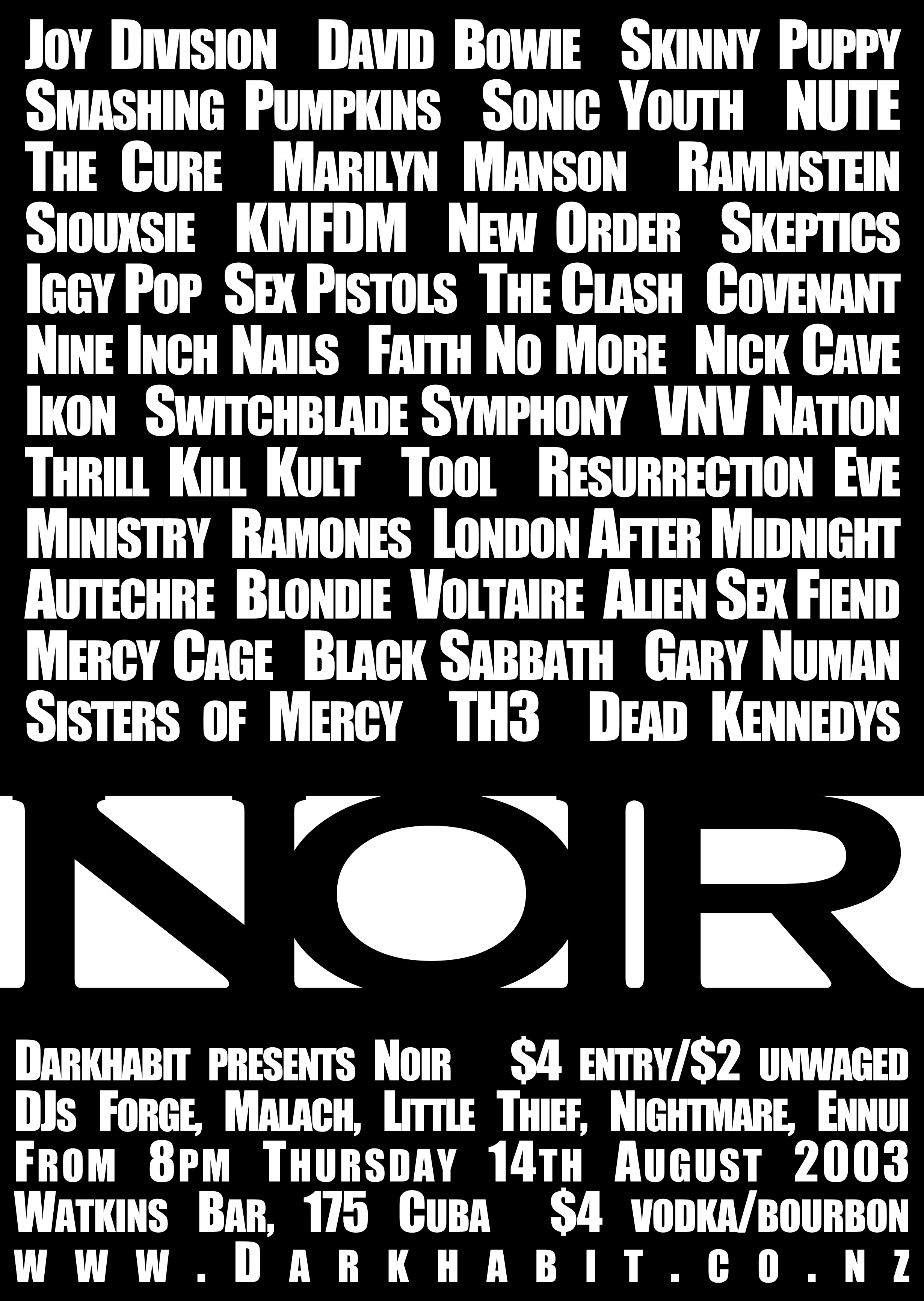
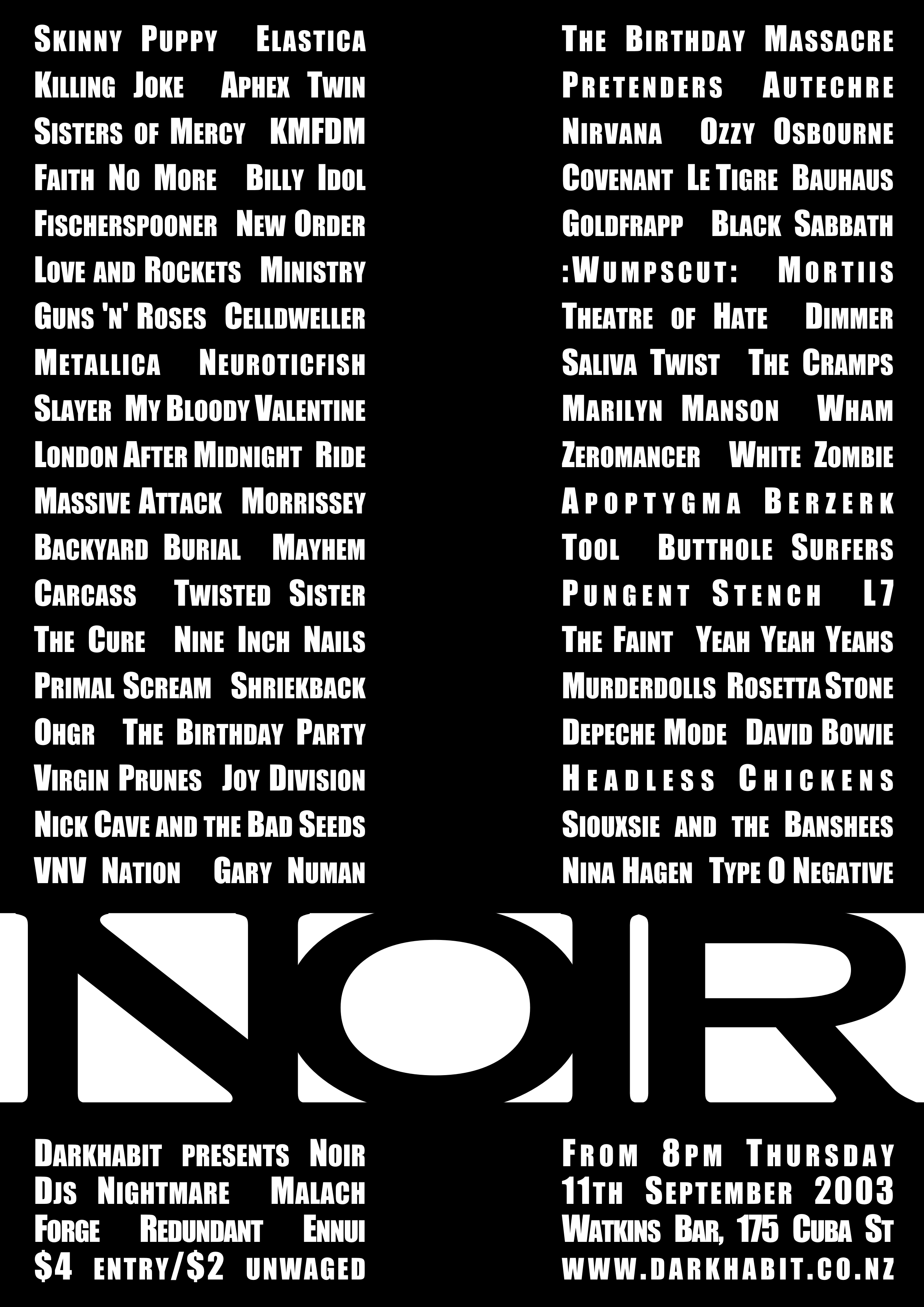
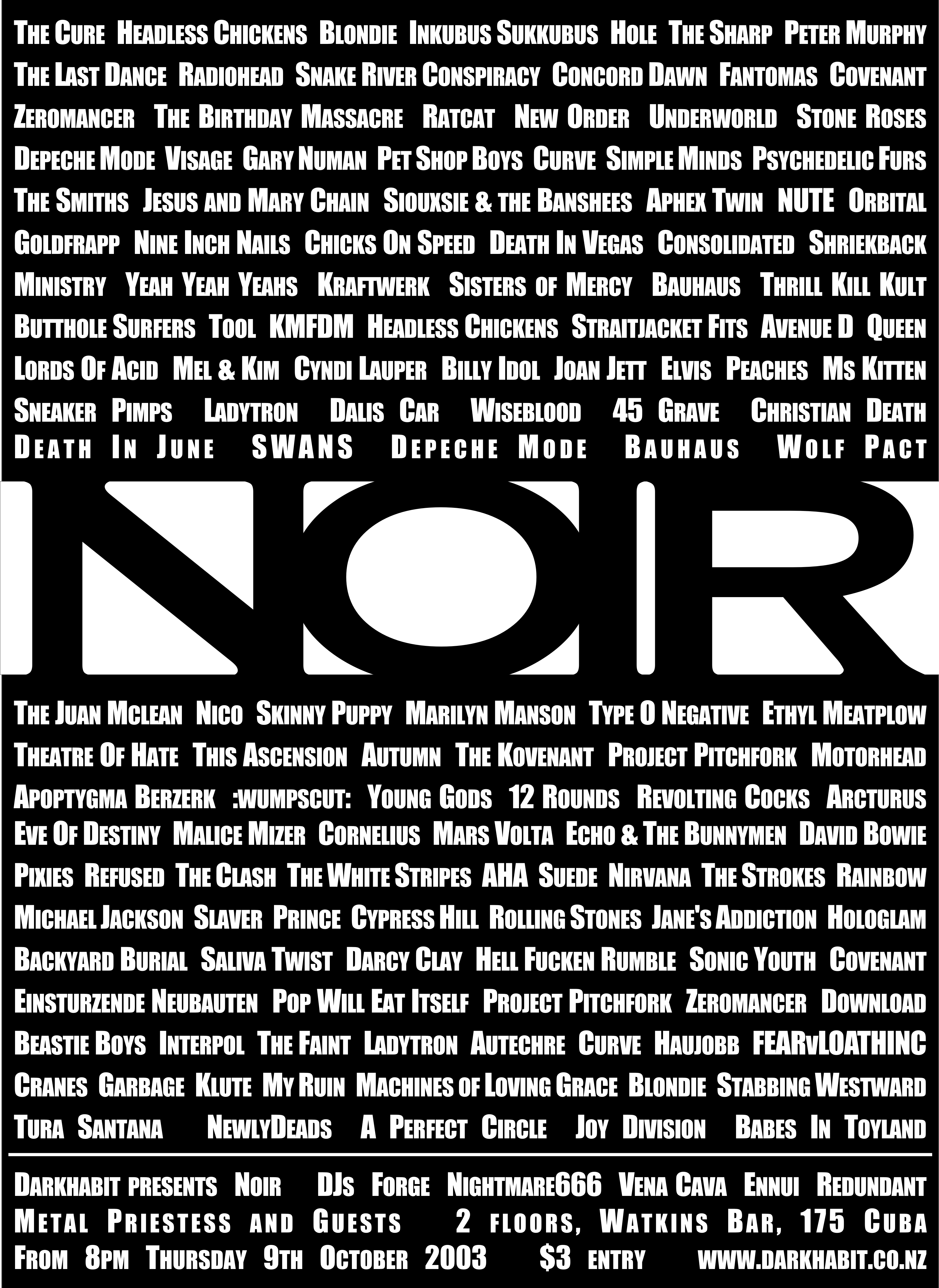
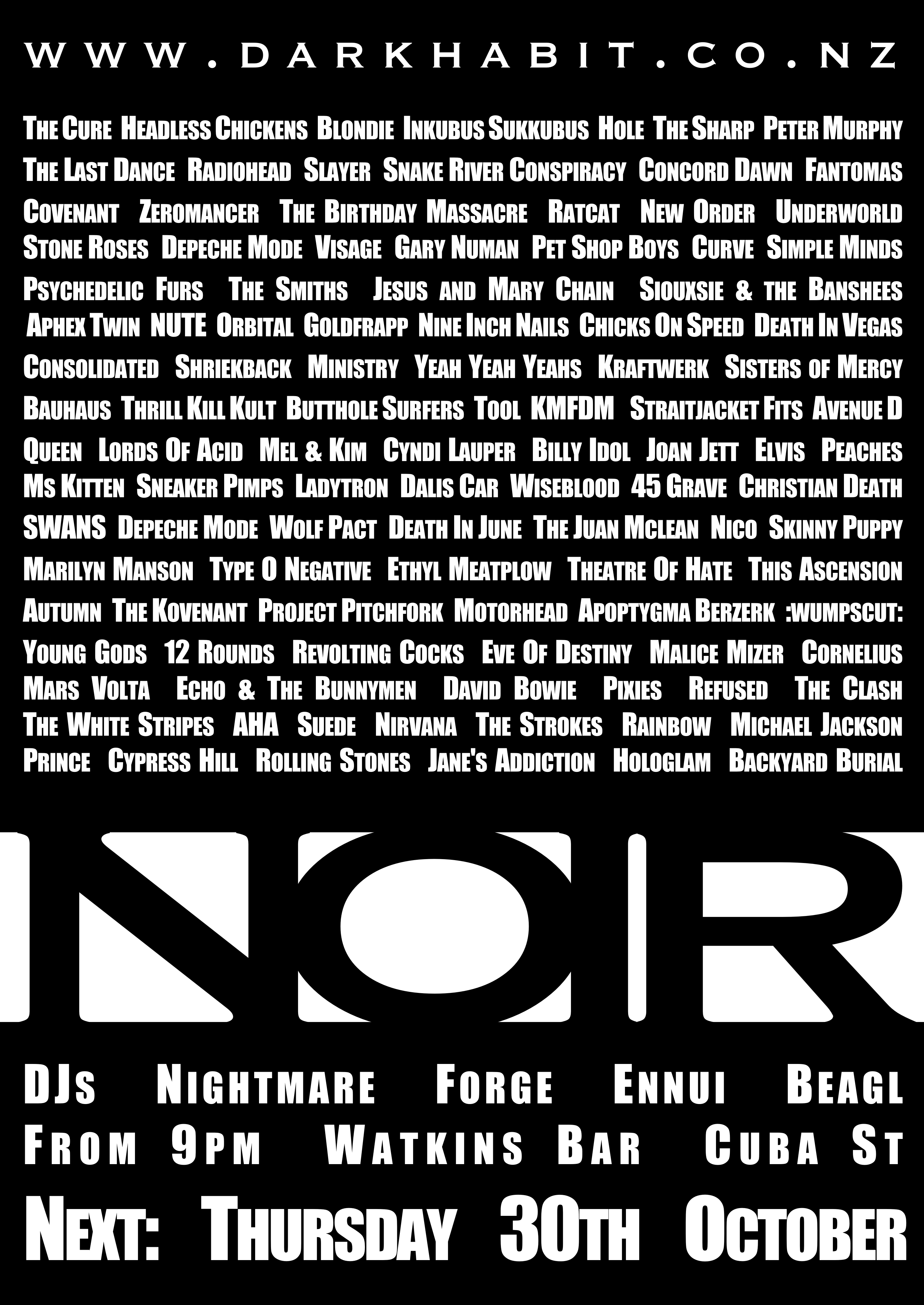

Darkangel & Eros was our initial foray into promoting goth gigs in Wellington. We started with a live gig called Pantomime featuring FearvLoathinc but the hand-created poster for that appears to be lost.
The real intention behind Darkangel & Eros was to organise DJ nights. I’d greatly enjoyed the ones I went to in Sydney and wanted something similar for Wellington.
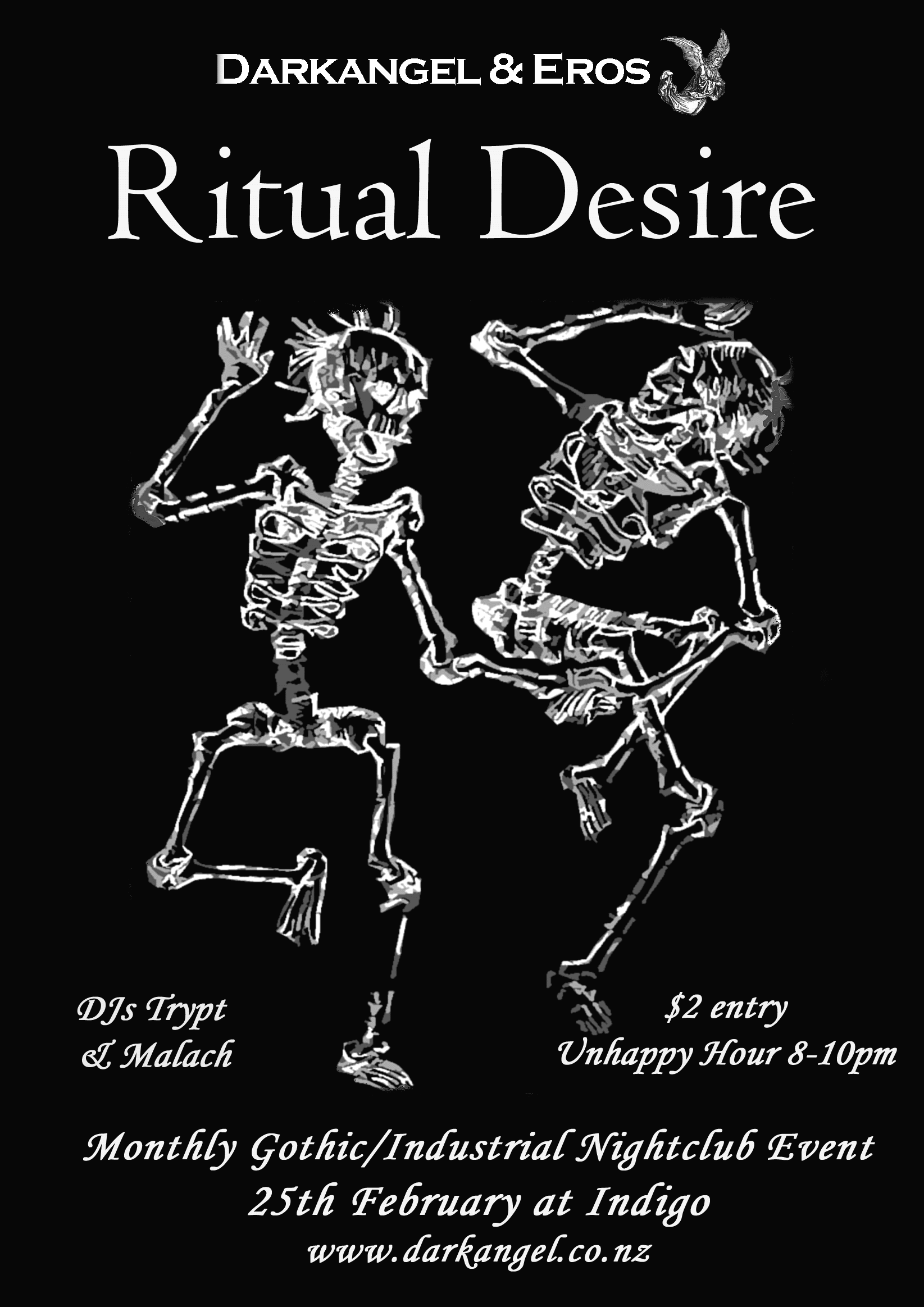




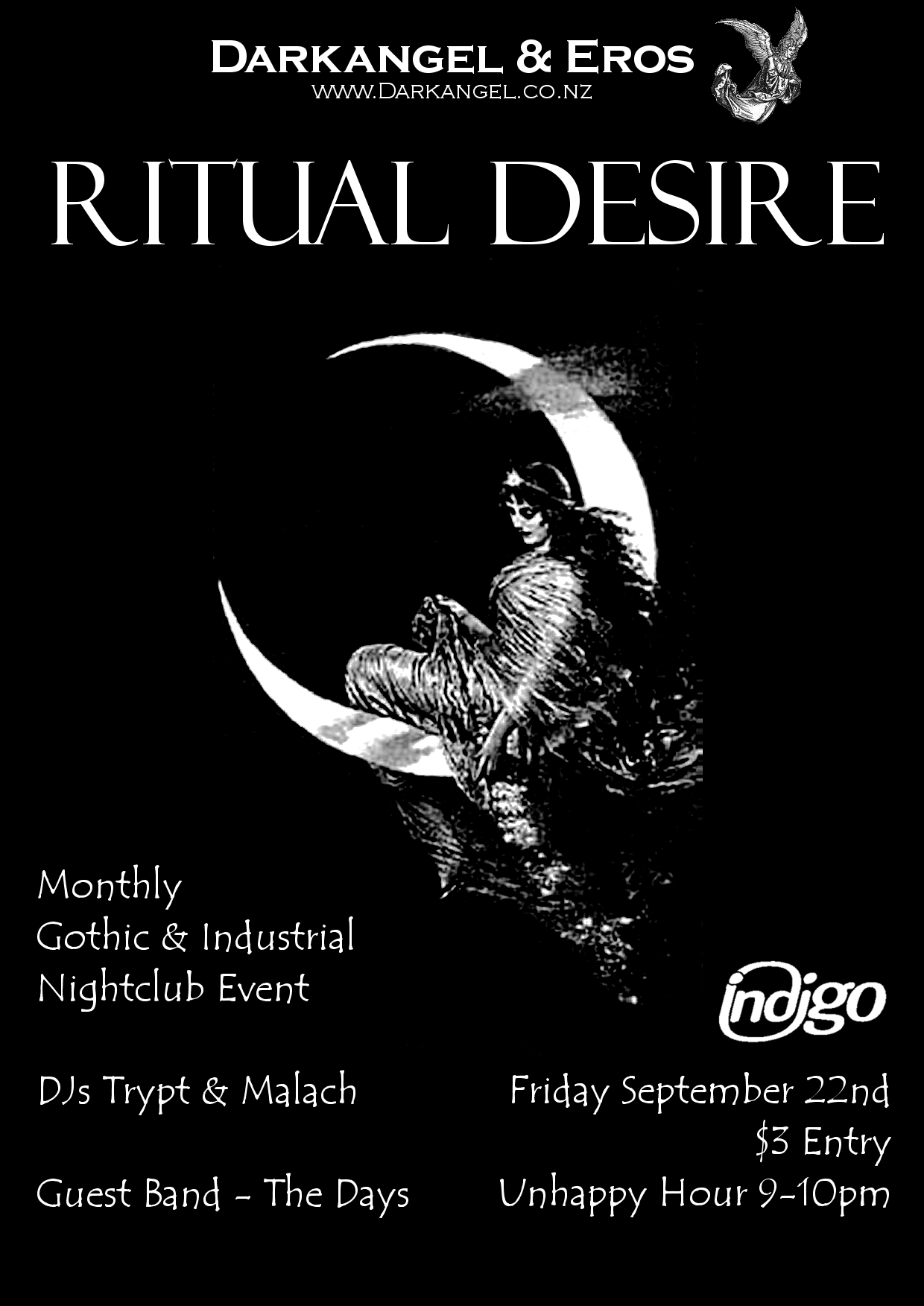


Nuclear Risk Diplomacy is a fast-paced strategy game where threat and bluster are a key part of the gameplay. While played on the Diplomacy board with the same pieces, it’s quite a different game where the combat is more Risk like, and of course there’s also the nukes.
A single nuclear weapon lays waste to an entire region (and the forces in it) and can be played at any time. But do you use them as weapons to get ahead or keep them as a deterrent to stop people using theirs on you? Should you build nukes or armies? With nukes you can eliminate another player at will, but then you’ll have nothing to defend yourself with when the other players’ armies roll over your borders. It’s all about maintaining the balance of terror!
I have no idea where this game came from or who created it. I was taught it in the late 1980s by some friends. These are the rules as I remember them and you’ll need to know the Diplomacy rules to understand them. Please send any comments to thomas@thomasbeagle.net
Requirements
- Standard Diplomacy set.
- 15 two-sided counters to represent nuclear weapons (nukes). Coins are ideal.
Setup
Set up board according to the Diplomacy rules.
Use the Diplomacy rules to choose which countries are playing (according to the number of players) and then randomly assign them to the players.
Allocate two nukes to each player. These should be placed on the coloured country name tags on the edge of the board. The stockpile of unallocated nukes are placed on Iceland.
Method of Play
Turns in NRD are either spring or fall. The game starts with spring and then alternates between them. (You may wish to use an indicator so that people don’t get confused.)
Choose a player to start the first turn. The start then rotates clockwise around the players changing each turn.
Each player in turn then moves their units, resolving any attacks as they go. The player gets to decide the order in which they move their pieces. Each unit can only be used once per turn.
Building Units and Nukes
At the end of the fall turn players get to build/lose army/navy units to match the number of supply centres they control. They must control at least one of their home supply centres to be able to build.
Building/reducing units happens at the end of the fall turn, in exactly the same way as in Diplomacy – except that you can also build nukes. Building a nuke requires two supply centres. A player cannot build a nuke if there are none available.
Nukes that have already been added to a player’s arsenal do not need to be supported by supply centres.
Playing Units and Combat
Units (army/navy) can move to an adjacent region, support an attack by another unit or stay where they are. Convoying (armies being transported by one or more fleets) works the same as in Diplomacy. There is no supporting defense.
Battles result when one unit (possibly supported by others) tries to move into a region already occupied by an opposing unit. The attacking player and the defending player roll a D6 for each piece involved, with the highest roll being the winner (draws are resolved in favour of the defender).
If the attack fails, nothing happens. If the attack succeeds, the defending player’s unit must retreat to an adjacent unoccupied region chosen by the defender (not the one where the attacker came from). If there is no where to retreat to the unit is destroyed.
Support
A unit can support the attack of another unit if the supporting unit is in a position where it could also move into the attacked region. Each supporting unit gives the attacking play an additional D6 to roll. Note that dice rolls are not added – if the attacker attacks with two armies and rolls a 2 and a 4 while the defender rolls a 5, the defender wins.
Playing Nukes
Nukes are played by placing them on a region of the board. This can be done by any player at any time.
The region is then contaminated and is impassable.
Supply centres that have been nuked cannot be used to support units and cannot be built on.
Nukes cannot be played at half-strength.
Mutants
If a unit is in the region when it is nuked, there is a 1 in 6 chance that the unit will spawn mutants. The player that the unit belongs to rolls a D6 and mutants are spawned if a 6 is rolled. The player then removes the nuked unit and places three additional units of their choice in regions adjacent to the nuked region.
Mutants are then treated as normal units. If you nuke your own army and get mutants, you may then move them as normal in that turn.
Nuke Clean Up
Regions contaminated by nukes can be rehabilitated by moving two units into them (at the cost of the units). Moving one unit in kills the unit and sets the contamination to half-strength (flip the coin representing the nuke). Moving a second unit into the region kills the unit, removes the contamination, and the nuke is returned to the stockpile.
A cleaned up supply centre does not belong to any player. (Therefore, to clean up a supply centre and take it you must move two in to clean it up and then move another in to take it. This can all be done in the same turn.)
Elimination and winning
Players are eliminated after losing all of their armies/navies, nukes, and home supply centres. Note that a player who has no armies or supply centres, and therefore cannot win, can still stay in the game and use their remaining nuclear stockpile to exact revenge.
The game is over when one player has control over half of the supply centres (18 supply centres out of 34) at the end of the fall turn, or when all other players are eliminated.
Variations
Vary the number of nukes allocated to the players at the start.
Vary the number of nukes in the game.
In 2009 I posted an article about how much I was prepared to pay for books, music, movies, etc. 12 years later it must be well past time for an update. There’s been some big changes, in particular how my music/watching has all moved to subscription services and all my fiction reading is digital.
Currently I’m prepared to spend (all NZ dollars):
- Nothing for an ‘album’ worth of music. It’s either included with my Spotify subscription or I’m ignoring it in favour of something that is.
- Nothing on a fiction paper book as all my reading is electronic now. I have asked for and received a couple of lovely coffee table books as presents.
- Up to $10 on an electronic book even if it’s encumbered and locked to my reading device.
- Up to $40/year for access to a good website or online service (e.g. MyFitnessPal, Scrabble, LastPass).
- Up to $10 for a phone app or up to $5 if it’s pretty trivial.
- Up to $15 to see a movie in a cinema but I don’t bother anymore.
- I guess up to $5 to watch a movie online (but I haven’t really bothered, it’s easier to watch Netflix).
- I guess up to $2 for a downloaded TV episode (but really it’s Netflix/TVNZ On Demand or nothing).
- New entry: I don’t really buy video games any more as I get more than enough from my $20/month Gamepass subscription.
In my last post, made a few months ago now, I argued in favour of passive index-based funds when choosing a KiwiSaver provider (i.e. a fund that tries to track a particular sub-market rather than one where people actively trade to maximise returns). This was on the grounds that they not only generate a better return when fees are taken into account, but that they often do better than the actively managed accounts on gross return as well. I’m still happy with that analysis.
However, I also argued that when investing for the long term the best returns have tended to come from investments in growth funds such as stock market index trackers rather than the more predictable cash and bonds; the idea being that while individual stocks may be risky the overall market has grown steadily.
Obviously this theory relies on the idea of the ever-growing economy caused by increasing production and consumption. I like to believe that this is possible, that the world will keep getting richer. The belief comforts me while I read books that describe the end of life as we know it through the effects of climate change, peak oil, or whatever other catastrophe looks good on the dustjacket.
I don’t know which outcome will come to pass in my lifetime or even which of them is the most likely. But I think there’s enough chance that I’ll live in a civilisation that will muddle through and growth-based funds will do well enough that they’re still the best choice. You could say that they track the success or otherwise of our civilisation.
However, at the moment I’ve chosen a cash-generating cash and bond index fund because I do think we’re in for a recession in the next few years. In this case I would expect stock market returns to fall in value or at least lag behind the high interest rates that are currently available. Why buy into it now when you could wait a few years?
I’ll tell you whether I’m right or not after it happens.
Some time ago I subscribed to eMusic.com for a number of reasons. Firstly, no matter how much I like my old favourites I crave the novelty of listening to music I haven’t heard before.
Secondly, I have completely and utterly lost the habit of buying CDs and I’d hardly know what to do with one once I got it. Thirdly, I can’t really be bothered with the hassle of finding and downloading music illegally. (RIP Oink, I miss you and your universal catalogue of well-ripped and properly tagged music.)
Fourthly, and in some ways most importantly to me when it came to actually signing up and paying money, eMusic did it right. The music you download from them is unencumbered moderately high-quality MP3s. No silly Apple or Microsoft enabled controls on what you could do with it or where you could listen to it.
I enjoyed using the service and got some good music to listen to (we’ll ignore the album of death-metal I downloaded by accident). But last year it didn’t seem worth it to me any more as I had no income and no decent internet connection, so I let my subscription lapse.
But eMusic is cunning and every so often they’d send me a little reminder email, “Come back! We has musics! Join us!” And then they got even more enticing and offered me 75 bonus downloads if I signed up again – so I did.
But there’s a new twist on the old service. eMusic’s catalogue was always a bit patchy and it was often a case of finding something good to download rather than going there with a particular artist or album in mind. But now it’s got even harder as:
We’re sorry. This album is unavailable for download in your country (New Zealand) at this time. We apologize for any inconvenience this may cause.
Even worse, eMusic is sending me titillating emails that are promoting the very albums that I’m not allowed to download!
Yes, the music industry is back to its old tricks of trying to impose their will on their customers, saying that they’d rather not take our money so that their “product/marketing geniuses” can continue to play their consumer segmentation games.
I thought they’d learnt, that the invisible hand of the marketplace had given them a good slapping around and that they had resolved to not be so stupid any more. Apparently I was wrong and we’re going to have to go through another round of watching the music industry indulge in self-destructive behaviour. Maybe one day they’ll finally get it and they’ll actually make it easy for me to give them money in exchange for music.
